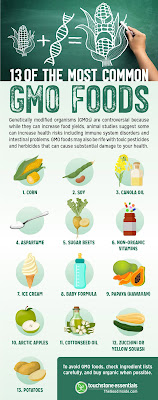Search This Blog
As stewards of our planet, it is essential for us to carefully consider how our choices—both individually and collectively—affect the future of the Earth. For too long, years of environmental mismanagement have led to challenges we can no longer ignore. The upcoming decade will be a crucial period that tests our ability to act with courage, clarity, and a strong sense of responsibility.
Posts
Showing posts from November 6, 2023
New Term "Bioengineered" Replaces the Widely Recognized Acronym "GMO"
- Get link
- X
- Other Apps
Much of the World Requires Labeling & Banning of GMOs, Why Not The United States?
- Get link
- X
- Other Apps
Genetically Engineered Salmon & Corn & Rice And The List Just Keeps Growing!
- Get link
- X
- Other Apps



